Navigating Outdoor Signage: A Comprehensive Analysis of Outdoor Acrylic Signs
When it comes to outdoor signage, outdoor acrylic signs stand out as a robust, versatile, and visually appealing option. This article provides comprehensive insights into acrylic signs as a option for outdoor signage, focusing on its specifications, durability, design flexibility, and visual impact. Whether you're exploring acrylic signage outdoor for its sleek appearance or evaluating outdoor sign material options, acrylic delivers unmatched quality and aesthetic appeal.
1. Acrylic Material Specifications: Understanding the Basics
- Temperature Tolerance: Outdoor acrylic signs can endure temperatures ranging from -30°F to 190°F, making them suitable for diverse climates. However, it's important to note that extreme temperatures can affect their performance.
- Impact Resistance and Thickness: While more impact-resistant than glass, acrylic's resistance to breakage varies with thickness. At Saifee Signs, we typically use at least 3/8 inch thick acrylic for outdoor acrylic signage to avoid easy breakage. However, 1/4 inch acrylic signs can be used in some cases.
- Size Considerations and Expansion: Acrylic expands approximately 3 times more than metal in high temperatures, which can affect larger signs. For acrylic signage outdoor that exceeds 24 inches, constructing in sections or using thicker material can help mitigate expansion issues in hot climates.
- Material Pricing: Acrylic is generally more expensive than other outdoor sign material options like PVC, CAB plastic, or HDU, but it’s more affordable than aluminum. The choice often depends on the budget and the desired aesthetic.
2. Durability of Acrylic in Outdoor Settings: A Comparative Analysis
- Against Other Materials: Outdoor acrylic signs offer greater weather resistance than softer materials like wood and PVC. They also avoid the rusting issues that some metals face, making them a more durable choice for outdoor signage.
- Clarity and Color: High-Density Urethane (HDU) is another material used for outdoor signs. It's lighter than acrylic and can be easily carved for dimensional signs. However, acrylic signs offer superior clarity and color vibrancy, making them better for detailed graphics and high-impact visual appeal. This makes acrylic signage outdoor a preferred option for those seeking vivid and lasting visuals.
- Longevity in Varied Climates: In environments like Houston, TX's temperate climate, an outdoor acrylic sign can effectively last for 5 to 10 years, withstanding constant sun exposure better than many alternatives. In areas with significant sunlight and weather variations, the UV resistance of acrylic makes it a superior outdoor sign material for long-term use compared to wood and PVC.
3. Design Flexibility of Acrylic Signs: Outshining Alternatives
- Advantages Over Glass and Metal: Acrylic's lightness and shatter-resistance offer significant advantages over glass, while its malleability surpasses that of wood and metal, allowing for more creative and intricate designs. Outdoor acrylic signs can be heated to become malleable, molded into various shapes, and then machined, drilled, or sawed once cooled. This flexibility in shaping makes acrylic signage outdoor a versatile choice compared to more rigid materials.
- Customization Possibilities: The adaptability of acrylic enables a wide range of design possibilities for outdoor acrylic signage. From clear, sleek looks to complex, multi-dimensional shapes, acrylic signs offer greater customization than materials like HDU (High-Density Urethane), allowing for truly unique and eye-catching outdoor sign material options.
4. Visual Impact and Color Vibrancy: Acrylic's Superior Aesthetic Appeal
- Comparative Clarity and Gloss: The inherent clarity and gloss of outdoor acrylic signs enhance the vibrancy of automotive-grade paints used on outdoor signs, offering more visual impact than materials like PVC, HDU Foam, or wood, which have a textured surface. Acrylic signage outdoor stands out for its ability to maintain a sleek, polished appearance that other materials cannot match.
- Maintaining Aesthetic Appeal: The smooth, consistent base of acrylic allows for high-resolution printing and excellent color retention, ensuring that the acrylic signs remain vibrant and eye-catching over time. This makes outdoor acrylic signage a top choice for those looking to maximize the visual appeal of their outdoor sign material.
All in all, outdoor acrylic signs are an exceptional choice for businesses looking to enhance their outdoor branding. Their durability, design flexibility, and visual impact make them stand out among other outdoor sign materials, offering a blend of practicality and aesthetic appeal. Whether you're considering acrylic signage outdoor for its long-lasting quality or vibrant appearance, these signs are a top choice. For more detailed insights on acrylic signs and their applications, check out our page for Outdoor Acrylic Signs
